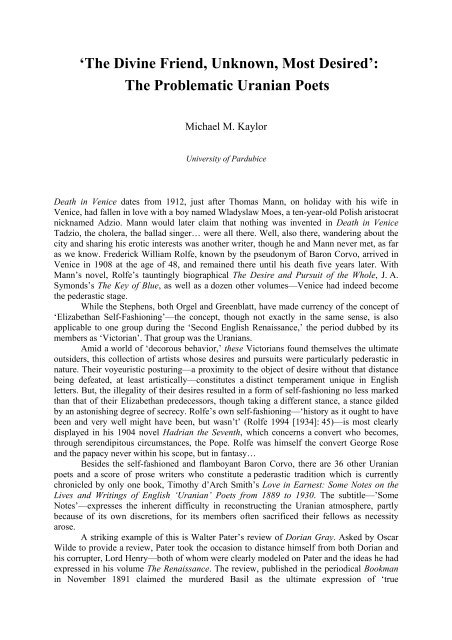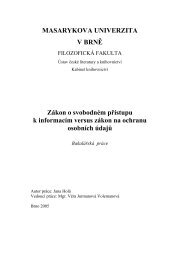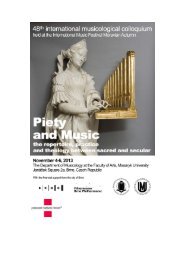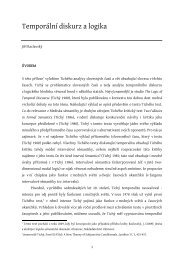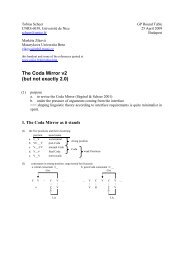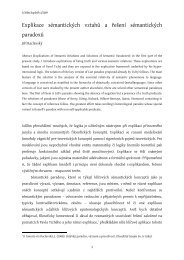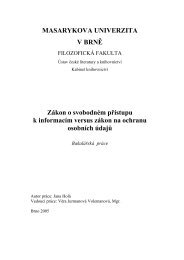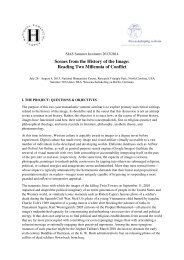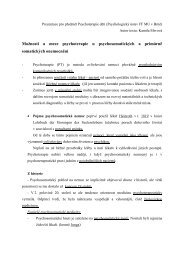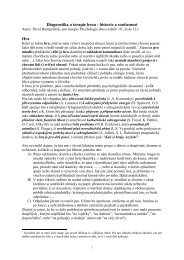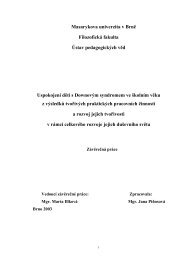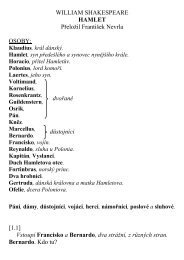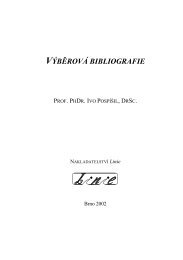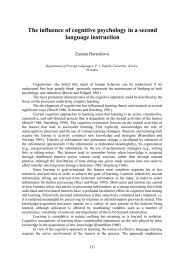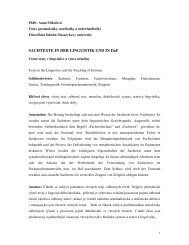'The Divine Friend, Unknown, Most Desired': The Problematic ...
'The Divine Friend, Unknown, Most Desired': The Problematic ...
'The Divine Friend, Unknown, Most Desired': The Problematic ...
You also want an ePaper? Increase the reach of your titles
YUMPU automatically turns print PDFs into web optimized ePapers that Google loves.
‘<strong>The</strong> <strong>Divine</strong> <strong>Friend</strong>, <strong>Unknown</strong>, <strong>Most</strong> Desired’:<br />
<strong>The</strong> <strong>Problematic</strong> Uranian Poets<br />
Michael M. Kaylor<br />
University of Pardubice<br />
Death in Venice dates from 1912, just after Thomas Mann, on holiday with his wife in<br />
Venice, had fallen in love with a boy named Wladyslaw Moes, a ten-year-old Polish aristocrat<br />
nicknamed Adzio. Mann would later claim that nothing was invented in Death in Venice<br />
Tadzio, the cholera, the ballad singer… were all there. Well, also there, wandering about the<br />
city and sharing his erotic interests was another writer, though he and Mann never met, as far<br />
as we know. Frederick William Rolfe, known by the pseudonym of Baron Corvo, arrived in<br />
Venice in 1908 at the age of 48, and remained there until his death five years later. With<br />
Mann’s novel, Rolfe’s tauntingly biographical <strong>The</strong> Desire and Pursuit of the Whole, J. A.<br />
Symonds’s <strong>The</strong> Key of Blue, as well as a dozen other volumes—Venice had indeed become<br />
the pederastic stage.<br />
While the Stephens, both Orgel and Greenblatt, have made currency of the concept of<br />
‘Elizabethan Self-Fashioning’—the concept, though not exactly in the same sense, is also<br />
applicable to one group during the ‘Second English Renaissance,’ the period dubbed by its<br />
members as ‘Victorian’. That group was the Uranians.<br />
Amid a world of ‘decorous behavior,’ these Victorians found themselves the ultimate<br />
outsiders, this collection of artists whose desires and pursuits were particularly pederastic in<br />
nature. <strong>The</strong>ir voyeuristic posturing—a proximity to the object of desire without that distance<br />
being defeated, at least artistically—constitutes a distinct temperament unique in English<br />
letters. But, the illegality of their desires resulted in a form of self-fashioning no less marked<br />
than that of their Elizabethan predecessors, though taking a different stance, a stance gilded<br />
by an astonishing degree of secrecy. Rolfe’s own self-fashioning—‘history as it ought to have<br />
been and very well might have been, but wasn’t’ (Rolfe 1994 [1934]: 45)—is most clearly<br />
displayed in his 1904 novel Hadrian the Seventh, which concerns a convert who becomes,<br />
through serendipitous circumstances, the Pope. Rolfe was himself the convert George Rose<br />
and the papacy never within his scope, but in fantasy…<br />
Besides the self-fashioned and flamboyant Baron Corvo, there are 36 other Uranian<br />
poets and a score of prose writers who constitute a pederastic tradition which is currently<br />
chronicled by only one book, Timothy d’Arch Smith’s Love in Earnest: Some Notes on the<br />
Lives and Writings of English ‘Uranian’ Poets from 1889 to 1930. <strong>The</strong> subtitle—’Some<br />
Notes’—expresses the inherent difficulty in reconstructing the Uranian atmosphere, partly<br />
because of its own discretions, for its members often sacrificed their fellows as necessity<br />
arose.<br />
A striking example of this is Walter Pater’s review of Dorian Gray. Asked by Oscar<br />
Wilde to provide a review, Pater took the occasion to distance himself from both Dorian and<br />
his corrupter, Lord Henry—both of whom were clearly modeled on Pater and the ideas he had<br />
expressed in his volume <strong>The</strong> Renaissance. <strong>The</strong> review, published in the periodical Bookman<br />
in November 1891 claimed the murdered Basil as the ultimate expression of ‘true
Michael M. Kaylor<br />
Epicureanism’ (Pater 1891: 59), and decried the flagrant sensuality that Wilde’s novel<br />
presents and represents. This review severed a fourteen-year friendship between the two,<br />
Pater choosing discretion over friendship. Wilde’s cultivations in love and in literature had<br />
become too overt and scandalous for Pater, who in turn cultivated as much distance between<br />
himself and his friend, in person and in print, as courtesy would allow.<br />
Or, another example: immediately after Simeon Solomon’s arrest in 1873 for<br />
importuning a man in a public urinal, Pater and Swinburne met in Oxford to discuss how to<br />
obliterate any traces of their intimacy with the painter. Pater always chose discretion over<br />
friendship, hoping not to find himself, as Wilde soon would, a defendant in the most famous<br />
of Victorian trials.<br />
With that in mind, it is perhaps not surprising that, in most cases, relationships among<br />
the members of this group were almost entirely textual, traceable only through bookplates,<br />
inscriptions, dedications, and acceptance letters. That they discussed pederasty and other<br />
forms of the homoerotic (whether classical or contemporary) among themselves is certain—<br />
but of these conversations we have only hearsay. Besides this, the Uranians often burned their<br />
correspondence and diaries (or their friends and families did so); or, as was the case with<br />
Pater, they covered their tracks by avoiding both. Charles Edward Sayle’s diary provides an<br />
example of why such was the case, with one entry in which he dreamed that his friend Horatio<br />
Forbes Brown (a friend of Rolfe’s whose parties were a feature of Venetian life) was ‘in<br />
a state of complete nudity, indecisive of what to use for a fig-leaf—a page of his own poems?<br />
or mine?’ (d’Arch Smith 1970: 110).<br />
Beyond their biographical obscurity, the Uranians often privately printed their<br />
volumes and circulated them only among their fellows, which requires a biographer or literary<br />
critic dealing with the movement to be equally an archaeologist and an archivist, for<br />
unfortunately the history of the Uranians is mostly contained within the sales catalogues of<br />
auction-houses like Southeby’s and Christie’s, the art going into the hands of private<br />
collectors like Seymour Stein, who acquired Solomon’s Bacchus for a mere £28,000 in 1993<br />
(Pacheco 1994: 79).<br />
For their more private uses, the Uranians themselves collected nude photographs by<br />
Wilhelm von Gloeden, whose guest book is itself a catalogue of the pederastically-inclined.<br />
Like Decadent children with baseball cards, the Uranians exchanged packets of these<br />
photographs. Edmund Gosse, discretely handed one packet by Symonds, kept stealing glances<br />
at it during the funeral service for Robert Browning at Westminster Abbey. Boys will be<br />
boys, one might say […] but there were real dangers involved in such exchanges.<br />
‘All things I love are dangerous,’ Marc-André Raffalovich once remarked, this poet<br />
and friend of Pater, Gosse, and Symonds. But, in the twentieth century and today, these<br />
dangerous Uranian collectables have become most prized… and for different reasons: fine<br />
papers, exquisite bindings, general rarity. <strong>The</strong> result is that many of the Uranian works<br />
(whether those be textual or visual) have disappeared into private collections like Stein’s, or<br />
have not surfaced since sales over fifty years ago.<br />
A case in point: presently for sale at William Dailey Rare Books in Los Angeles is<br />
Raffalovich’s own copy of Sayle’s poem Bertha: A Story of Love, published in a limited<br />
edition by Kegan Paul in London in 1885. What is of interest to a book collector is its original<br />
blue cloth, lettered in gilt, blocked in gilt with a device of a sail (a pun on the author’s name)<br />
designed by Burne-Jones. Its price of $750 is slightly less than usual because it has one worn<br />
corner, light wear to its boards, several spots of foxing to the flyleaf—but is otherwise fine.<br />
Such is the view of an antiquarian. But, to a biographer of the Uranian movement like myself,<br />
the book is priceless, for it bears three bookplates of Raffalovich, to whom the book was<br />
originally presented. <strong>The</strong> book’s ultimate value is not contained in its ornamental binding, but<br />
72
‘<strong>The</strong> <strong>Divine</strong> <strong>Friend</strong>, <strong>Unknown</strong>, <strong>Most</strong> Desired: <strong>The</strong> <strong>Problematic</strong> Uranian Poets<br />
the traces it provides of a line of descent, exchange, and Uranian intimacy, linking undeniably<br />
Sayle and Raffalovich (see d’Arch Smith 1970: 77).<br />
Another striking example of such a text is Frederick Rolfe’s Desire and Pursuit of the<br />
Whole, first published in 1934, in conjunction with A. J. A. Symons, <strong>The</strong> Quest for Corvo: an<br />
experiment in biography (a recent edition of which has an introduction by A. S. Byatt) in<br />
which Symons chronicles his difficulties unearthing the Rolfe manuscripts, as well as the<br />
details of his salacious life, details which are thinly veiled in the novel.<br />
As far as Rolfe’s novel is concerned, we can forgo the adventures of his protagonist<br />
Nicholas Crabbe in exposing the hypocrisies of the other English expatriates in Venice, or the<br />
vitriol he throws upon his former friends (both of which constitute substantial portions of the<br />
text)—what is striking is Crabbe’s relationship with his gondolier, ‘an innocent expert wellknit<br />
frank boy’ (Rolfe 1994 [1934]: 52), with only one fault:<br />
[Nicholas] always laid singular and particular stress upon the influence of her<br />
phenomenally perfect boyishness—not her sexlessness, not her masculinity, but<br />
her boyishness […] She looked like a boy: she could do, and did do, boy’s<br />
work, and did it well: she had been used to pass as a boy, and to act as a boy;<br />
and she preferred it: that way lay her taste and inclination: she was competent in<br />
that capacity. […] A youth knows and asserts his uneasy virility: a girl<br />
assiduously insinuates her femminility. [Gilda] came into neither category. She<br />
was simply a splendid strapping boy—excepting for the single fact that she was<br />
not a boy, but a girl. (Rolfe 1994 [1934]: 48-49)<br />
Here we have Uranian self-fashioning taking a rather Elizabethan twist, for the ensuing<br />
dalliance and the eventual erotic fulfillment which concludes the novel would have been<br />
untenable if Zildo the gondolier were not, in actuality, the boyish Gilda whom Nicholas had<br />
pulled from rubble after an earthquake, an act that drove Gilda to swear her perpetual<br />
servitude, in the only capacity in which Nicholas needed a servant… as his gondolier. But,<br />
after this episode has been duly explained, the writer and the reader proceed to forget that the<br />
boy is not a boy, which brings us into constant proximity—but only proximity—with the<br />
ultimate object of Rolfe’s desires:<br />
[Zildo’s] cleansing operations [of the boat] brought him near his master’s chair.<br />
He crept balancing along the gunwale with his cloth, to polish the prow. As he<br />
came crawling back, a little shy breath of night sighingly lifted and spread the<br />
splendour of the fair plume waving in noble ripples on his brow. Nicholas had<br />
a sudden impulse to blow it, just for the sensuous pleasure of seeing its beauty<br />
in movement again—it was within a hand’s length of his lips.<br />
‘To land,’ he instantly commanded, checking himself with a shock, sternly<br />
governing mind with will. […] But, perhaps Zildo would not have snubbed<br />
him? ‘So much the worse, o fool! Hast thou time or occasion for dalliance?’<br />
Thus, he reigned up his soul, prone to sink, prompt to soar.<br />
(Rolfe 1994 [1934]: 107-108)<br />
Or this scene, more tauntingly tactile:<br />
And then, all of a sudden, on this iridescent morning of opals in January, when<br />
the lips of Zildo touched the hand of Nicholas, owner of lips and owner of hand<br />
experienced a single definite shock: an electric shiver tingled through their<br />
veins: hot blood went surging and romping through their hearts: a blast, as of<br />
73
Michael M. Kaylor<br />
rams’ horns, sang in their ears and rang in their beings; and down went all sorts<br />
of separations. […] He thrust the whole affair out of his mind. Zildo was worthy<br />
of all praise—as a servant. And—custodia oculorum—it might be as well not to<br />
look at Zildo quite so much. (Rolfe 1994 [1934]: 122-123)<br />
<strong>The</strong> passage above displays typical Uranian posturing, a proximity to the object of desire<br />
without transgressing that voyeuristic distance, ‘history as it wasn’t but as it very well might<br />
have been’. For, to come too close often brought the actual into absolute contrast with the<br />
desired. Rolfe’s letters from Venice—private but not destroyed—display how this desirous<br />
proximity found itself expressed in everyday life:<br />
A Sicilian ship was lying alongside the quay and armies of lusty youths were<br />
dancing down long planks with sacks on their shoulders which they delivered in<br />
a warehouse ashore. <strong>The</strong> air was filled with a cloud of fine white floury dust<br />
from the sacks which powdered the complexions of their carriers most<br />
deliciously and the fragrance of it was simply heavenly. As I stopped to look<br />
a minute, one of the carriers attracted my notice. <strong>The</strong>y were all half naked and<br />
sweating. I looked a second time as his face seemed familiar. He was running<br />
up a plank. And he also turned to look at me. Seeing my gaze he made me<br />
a sign for a cigarette. I grabbed at my pockets but hadn’t got one; and shook my<br />
head. He ran on into the ship. I ran off to the nearest shop and came back with<br />
a packet of cigs and a box of matches to wait at the foot of his plank. Presently<br />
he came down the plank dancing staggeringly under a sack. I watched him.<br />
Such a lovely figure, young, muscular, splendidly strong, big black eyes, rosy<br />
face, round black head, scented like an angel. As he came out again running<br />
(they are watched by guards all the time), I threw him my little offering:<br />
—Who are you?<br />
—Amadeo (lovely mediaeval name).<br />
<strong>The</strong> next time,<br />
—What are you carrying?<br />
—Lily-flowers for soap-making.<br />
<strong>The</strong> next time,<br />
—Where have I seen you?<br />
—Assistant gondolier one day with Piero last year.<br />
<strong>The</strong>n,<br />
—Sir, Round Table (a homosexual fraternity).<br />
I’m going to that ship again tomorrow morning. I want to know more.<br />
Did Rolfe return the next day? Did it lead to more than cigarettes and banter and insinuation?<br />
I haven’t a clue. I only know that Rolfe would soon lie dying in his beloved Venice, staring<br />
off toward a shoreline full of gondoliers, still waiting for his own Tadzio/Zildo, ‘<strong>The</strong> <strong>Divine</strong><br />
<strong>Friend</strong>, <strong>Unknown</strong>, <strong>Most</strong> Desired’ (which was Rolfe’s personal motto). <strong>The</strong>se two aspects, ‘the<br />
unknown’ and ‘the most desired’, these encapsulate both the Uranian movement and its<br />
elusiveness.<br />
74
‘<strong>The</strong> <strong>Divine</strong> <strong>Friend</strong>, <strong>Unknown</strong>, <strong>Most</strong> Desired: <strong>The</strong> <strong>Problematic</strong> Uranian Poets<br />
If this strand of pederastic writers is ever to be properly engaged, it will probably be<br />
through Gerard Manley Hopkins, for only in the case of Hopkins do we find a poetry of<br />
grandeur blended with Uranian sentiment. Laid alongside Hopkins’s ‘Epithalamion’, the<br />
poetry of the others seems facile, the prose equally so, such that only in Pater—and to<br />
a limited extent Henry James—does this sentiment reach high art. But, it is because of two<br />
other aspects that Hopkins lends himself to such a choice. Firstly, he detested the selffashioning<br />
distinctly this group’s. In a short unpublished treatise, Hopkins writes:<br />
when I consider my selfbeing, my consciousness and feeling of myself, that<br />
taste of myself, of I and me above and in all things, which is more distinctive<br />
than the taste of ale or alum, more distinctive than the smell of walnutleaf or<br />
camphor, and is incommunicable by any means to another man (as when I was<br />
a child I used to ask myself: What must it be to be someone else?). Nothing else<br />
in nature comes near this unspeakable stress of pitch, distinctiveness, and<br />
selving, this selfbeing of my own. (Hopkins 1959: 123)<br />
While his nom de plume allows Rolfe to be playful and scathing, its absence allows Hopkins<br />
a self-honesty equally brutal. It is this degree of honesty which makes him unique among the<br />
Uranians. Secondly, as the Times Literary Supplement made clear half a century ago: ‘No<br />
modern poet has been critically commented on in more detail. […] Rarely has a poet attracted<br />
such a burden of documentation and commentary’ (Anon 1959: 544). His poems, letters,<br />
journals, confessional notes—all added to the ‘biographically known’ (such as his perpetual<br />
friendship with Pater)—these enable us to reconstruct Hopkins’s Uranian desires more fully<br />
than those of the others, even Rolfe.<br />
Hopkins is the most obvious bull’s eye for scholarship, which is made clear by<br />
a fragment found among his papers after his death:<br />
Denis,<br />
Whose motionable, alert, most vaulting wit<br />
Caps occasion with an intellectual fit.<br />
Yet Arthur is a Bowman: his three-heeled timber’ll hit<br />
<strong>The</strong> bald and bold blinking gold when all’s done<br />
Right rooting in the bare butt’s wincing navel in the sight of the sun.<br />
(Hopkins 1990 [1918]: 155)<br />
‘His three-healed timber […] Right rooting in the bare butt’s wincing navel’ is an image that<br />
Victorian scholarship hopes not to see ‘bald and bold’ in ‘the sight of the sun’. <strong>The</strong> salacious<br />
is best ignored—in terms of these Uranians.<br />
A diary entry by Mark Pattison from May 1878 makes one wonder how Hopkins,<br />
appointed to a Jesuit curacy eight months later, could have claimed ‘By the by, when I was at<br />
Oxford, Pater was one of the men I saw most of’ (Hopkins 1956: 246). Pattison’s diary reads:<br />
To Pater’s to tea, where Oscar Browning was more like Socrates than ever. He<br />
conversed in one corner with four feminine looking youths ‘paw dandling’ there<br />
in one fivesome, while the Miss Paters and I sat looking on in another corner—<br />
Presently Walter Pater, who, I had been told, was ‘upstairs’ appeared, attended<br />
by two more youths of similar appearance. (Quoted in Pater 1970: xxxiv)<br />
Oscar Browning, who would be sacked from Eton the following September under suspicion<br />
of pederasty because of his involvement with the young George Curzon (later Viceroy of<br />
75
Michael M. Kaylor<br />
India), ‘paw dandling’ with four boys in a corner (rather tactile phrasing to be certain), while<br />
Pater, said to be ‘upstairs’ (an area beyond the bounds of Victorian guests, however intimate),<br />
reappearing with two boys in tow—that was excessive to an extreme for Pattison… but for<br />
Hopkins? Well, the only extant letter between these two friends (probably saved from<br />
oblivion because Hopkins had drafted a poem on the verso) is Pater’s acceptance of an<br />
invitation to dinner… at the Jesuit presbytery. Wilde always praised ‘feasting with panthers’,<br />
and Hopkins, like Wilde, would have had no trouble recognizing ‘pater’ within that pun.<br />
Works Cited<br />
Anon. (25 Sept. 1959) ‘Rare ill-broker’d talent’ Times Literary Supplement: 544.<br />
D’Arch Smith, Timothy (1970) Love in Earnest: Some Notes on the Lives and Writings of<br />
English ‘Uranian’ Poets from 1889 to 1930, London: Routledge and Kegan Paul.<br />
Hopkins, Gerard Manley (1956) Further Letters of Gerard Manley Hopkins, Abbott. C. C.,<br />
ed., Oxford: Oxford University Press.<br />
(1990 [1918]) <strong>The</strong> Poetical Works of Gerard Manley Hopkins, MacKenzie, Norman H., ed.,<br />
Oxford: Clarendon Press.<br />
——— (1959) <strong>The</strong> Sermons and Devotional Writings of Gerard Manley Hopkins, Devlin,<br />
Christopher, ed., Oxford: Oxford University Press.<br />
Pacheco, Patrick (1994) ‘<strong>The</strong> Pasha of Pop’ Art and Antiques 5: 78-79.<br />
Pater, Walter (1970) Letters of Walter Pater, Evans, Lawrence, ed., Oxford: Clarendon Press.<br />
——— (1891) ‘A Novel by Mr. Oscar Wilde’ Bookman 1: 59-60.<br />
Rolfe, Frederick (1994 [1934]) <strong>The</strong> Desire and Pursuit of the Whole, Bayley, John, ed., New<br />
York: George Braziller.<br />
76


